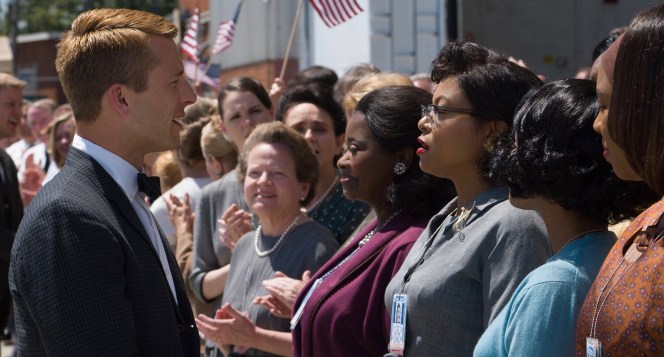There is nothing subtle about the racism and sexism that pervaded our society, especially in the South, during the 1950s and 1960s–so criticizing a movie about that period for being blatant in its treatment of the subject may be wrongheaded. Hidden Figures compensates for a lack of nuance by telling a story so incredible and inspiring it’s hard to believe we haven’t known of it before.
Taraji P. Henson, Octavia Spencer and Janelle Monáe play brilliant young women who work for NASA in Langley, Virginia at the outset of the space race. Henson is a mathematical genius whose gift was recognized when she was just a child, but like her friends she suffers from two societal problems: she is black and female. NASA employs a number of intelligent African-American women, but it’s still a man’s world and strictly segregated. Even when Henson is promoted to a position of crucial importance she still has to run half a mile to a “colored” restroom.
Spencer’s character works as a “computer,” but when she sees the agency installing a gigantic IBM machine she takes it upon herself to learn programming and teaches her colleagues so they can stay ahead of the curve. Monáe needs a judge’s permission to attend night classes to expand her knowledge and fights for that right…while raising a family.
Even allowing for dramatic license, this is a remarkable saga. All three women deserve to be better known and recognized for their work. Katherine Johnson, who is portrayed here by Henson, was recently awarded the Presidential Medal of Freedom at age 97.
The film’s other leading character is white and male, a composite figure played by Kevin Costner. As the person tasked with crunching the numbers needed to launch a man into space, and then into orbit, he works with brilliant men and is only interested in results. Yet he can’t avoid noticing Henson’s brilliance and gives her room to grow, unlike his hidebound staff. Was there someone as progressive as that at NASA? I’d like to think so.
Hidden Figures is based on a just-published book by Margot Lee Shetterly, adapted by Allison Schroeder and the film’s director Theodore Melfi. It is designed to rouse an audience and I can’t see how it can fail to do so. The heroines of this tale are both admirable and likable, as played by these three talented actresses. The barriers they break are begging to be demolished. What the movie may lack in nuance it makes up for in good will.








